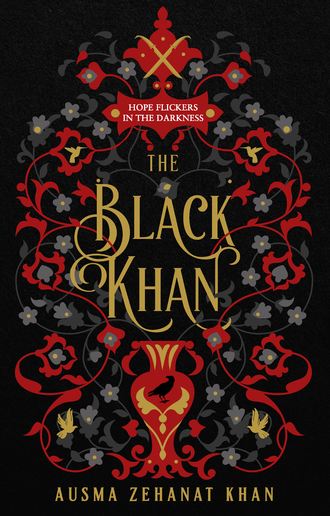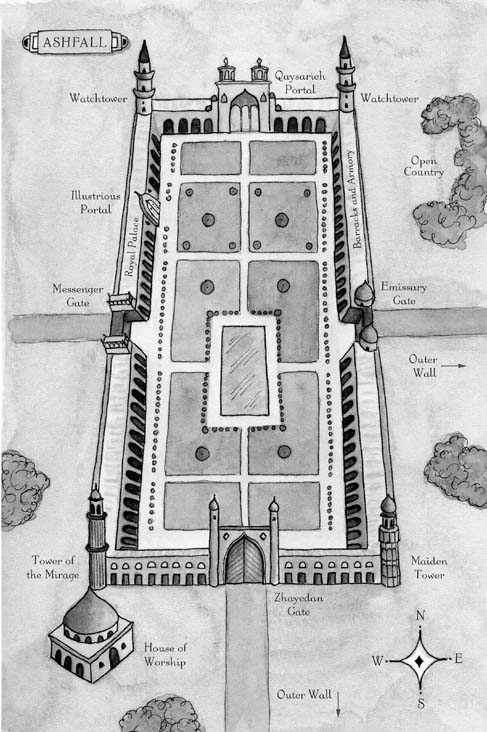
Полная версия
The Black Khan



Copyright
HarperVoyager
An imprint of HarperCollinsPublishers Ltd
1 London Bridge Street
London SE1 9GF
www.harpercollins.co.uk
First published in Great Britain by HarperVoyager 2018
Copyright © Ausma Zehanat Khan 2018
Cover illustration © Shutterstock.com
Cover design Micaela Alcaino © HarperCollinsPublishers Ltd 2018
Maps created by Ashley P. Halsey, inspired by Alesha Shaikh
Ausma Zehanat Khan asserts the moral right to be identified as the author of this work.
A catalogue copy of this book is available from the British Library.
This novel is entirely a work of fiction. The names, characters and incidents portrayed in it are the work of the author’s imagination. Any resemblance to actual persons, living or dead, events or localities is entirely coincidental.
All rights reserved under International and Pan-American Copyright Conventions. By payment of the required fees, you have been granted the non-exclusive, non-transferable right to access and read the text of this e-book on screen. No part of this text may be reproduced, transmitted, down-loaded, decompiled, reverse engineered, or stored in or introduced into any information storage and retrieval system, in any form or by any means, whether electronic or mechanical, now known or hereinafter invented, without the express written permission of HarperCollins.
Source ISBN: 9780008171629
Ebook Edition © October 2018 ISBN: 9780008171643
Version: 2018-09-17
Dedication
For Hema,
whose friendship, love, and decency
have saved me all these years
Contents
Cover
Title Page
Copyright
Dedication
Maps
Chapter 1
Chapter 2
Chapter 3
Chapter 4
Chapter 5
Chapter 6
Chapter 7
Chapter 8
Chapter 9
Chapter 10
Chapter 11
Chapter 12
Chapter 13
Chapter 14
Chapter 15
Chapter 16
Chapter 17
Chapter 18
Chapter 19
Chapter 20
Chapter 21
Chapter 22
Chapter 23
Chapter 24
Chapter 25
Chapter 26
Chapter 27
Chapter 28
Chapter 29
Chapter 30
Chapter 31
Chapter 32
Chapter 33
Chapter 34
Chapter 35
Chapter 36
Chapter 37
Chapter 38
Chapter 39
Chapter 40
Chapter 41
Chapter 42
Chapter 43
Chapter 44
Chapter 45
Chapter 46
Chapter 47
Chapter 48
Chapter 49
Chapter 50
Chapter 51
Chapter 52
Chapter 53
Chapter 54
Chapter 55
Chapter 56
Chapter 57
Chapter 58
Chapter 59
Chapter 60
Acknowledgments
Cast of Characters
Glossary of the Khorasan Archives
About the Author
Also by Ausma Zehanat Khan
About the Publisher
Maps



1
IN THE DESERTED COURTYARD OF THE CLAY MINAR, THE BODIES OF BASMACHI fighters were gathered in a pile beneath a stunted tree in the shelter of a square stone base. White ribbons streamed down from the tree’s slender limbs, tied to its branches and twigs. The ribbons were bare of script: the people of Black Aura could not write. The ribbons were meant as a reminder of their sacred traditions; they were desperate, desolate prayers. The bodies piled beneath the tree formed the Authoritan’s answer to those prayers.
No wind stirred the ribbons or the dying branches. Sunlight blunted the edges of Arian’s vision, and she found her way around the tree more by instinct than anything else. She knew she was about to be taken inside the house of worship, just as she knew the Authoritan expected a demonstration of her power, a compulsion she had resisted with all the force and determination she was capable of as a Companion of Hira.
There were only three people in the courtyard: Arian, the Authoritan, and his consort, Lania, Arian’s older sister. Each night since she’d been captured in Black Aura attempting to retrieve the Bloodprint, Lania and the Authoritan had brought Arian to this place. They showed her the stunted tree and the bodies moldering beneath it, then coerced her into entering the blue-domed house of worship to test her abilities with the Claim.
Situated on the eastern side of the square, the dome was the pinnacle of a massive structure. Four arcades met at its doubled entrance, each lined with portals decorated with mosaics and glazed bronze brick. At the entrance to the main portal, a sand-colored octahedron with open arches could be reached by a set of stairs. Here great recitations of the Claim had once been addressed to the people of Black Aura, the Bloodless sharing the teachings of the Bloodprint, an ancient and powerful manuscript long believed to be lost. The manuscript that was the oldest, most venerable record of the Claim—the powerful, mysterious magic seeded throughout the history of all the lands of Khorasan, but lost to a people now condemned to a final Age of Ignorance.
Skirting the pulpit, Arian was taken through to the indoor galleries covered by dozens of smaller domes perched on a peristyle. Though well lit, the interior space was cold, and as quiet and deserted as the courtyard.
They stopped at a niche in the wall where multicolored mosaics were arranged in a magnificent declamation. Lania read the words first, verses commonly known to the Companions of Hira, though Lania’s inflection was different, the words gathered up in hubris and flung out, outlining the niche in a darkly radiant fire while the Authoritan nodded his approval.
Prodded by her sister, Arian repeated the same words, her strong voice giving them distinctions of grace that coaxed out their inner meaning.
The Authoritan looked down on Arian from the top of a flight of wooden stairs positioned beside the niche. He stood tall and thin, enclosed in his white robes, his ghastly crimson eyes flickering out from a bloodless white face, a nimbus of silver hair floating above the harshly etched bones of his skull. He seemed too frail to do her any damage, yet his hands and voice transmitted his inescapable power.
“Now the rest.”
His reedy voice was like a needle in Arian’s ear.
“That’s all there is,” she said.
“You know the conclusion of these verses from your training at the Citadel of Hira. Recite them for us now.”
The cold command in his voice whipped at Arian’s nerves. It was a compulsion to do as he asked or suffer intolerable pain. Yet she’d learned that though he could otherwise affect her, he could not compel the Claim to issue from her lips. It was a tiny point of victory that Arian held to herself, infusing her with a strength of self-reliance that was no reproof against the pain.
He raised a bony finger in the air and aimed it at the top of her skull. “Recite.”
The word stabbed at Arian’s temples, a sharp, probing injury. She reached for Lania’s hand, insisting that her sister acknowledge the injury being done to her. But Lania stepped back, her painted face impassive, the bonds of sisterhood sundered by the tortures she was forced to endure.
“Recite!”
Now the word thundered through Arian’s skull. The muscles of her throat seized up; Arian began to shiver. The Authoritan could visit pain upon her—this he had shown her night after night, cruel and imaginative in his punishments. Yet her training at Hira resisted him. Of greater significance, the Claim resisted him, refusing to issue from her throat, a pitiless battle of magic against magic that caused her palpable injury. It was no different this day: she was forced to her knees by the Authoritan’s power, pressure building in her skull. Teardrops of blood leaked from her eyes, a sickening residue on her skin. She choked on the scent of it, tainted and dark, and tasted it in her mouth.
She had exerted this power over men—the power of the Claim—but it had never been used against her—a battle of the occult against the uncorrupted. It was a setback, nothing more. She wouldn’t let the Authoritan twist the beauty and power of her magic. She fought to raise her head. She held on to her circlets, the two gold armbands that signified her status as a Companion of Hira, one of a group of women entrusted with the care of the sacred scriptorium at the Citadel. The Citadel was the stronghold of the Companions of Hira, a place where they sought to protect the written word from the devouring onslaught of the Talisman, men—and it was always men—who waged war upon all forms of knowledge, under the flag of the One-Eyed Preacher, a tyrant whose will Arian had spent a decade trying to subvert.
As a Companion, Arian had been charged with a mission to rescue the women of Khorasan from the Talisman’s efforts at enslavement. But then the leader of her order, the High Companion Ilea, had assigned her to seek out the Bloodprint as a means of unseating the Talisman. Arian had been chosen for this Audacy because of her exceptional gifts. She was Hira’s most accomplished linguist, fluent in the Claim and armed with the power of its magic. She was First Oralist of Hira.
And because of that—and despite the tortures the Authoritan inflicted—she should be able to resist.
Gasping at the effort, she tried to draw power from the inscriptions on her circlets. Her fledgling attempt failed, just as it had before. She was brought to a posture of submission once more, her arms stretched out before her, her forehead pressed to the floor in a perversion of the prayers of their people.
“Lania—” Her sister’s name came out as a croak, weakly demanding an apology.
“It’s a pity to watch you suffer.” Yet there was no trace of pity in Lania’s voice; a cool impassivity ruled her as she ignored Arian’s entreaty. Lania took her place at the Authoritan’s side, gliding gracefully up the stairs, her long robe trailing behind her.
The Authoritan brought her hand to his bloodless lips and kissed it. “She tires me,” he said. “If she will not share what she knows of the Claim, perhaps the Silver Mage can be put to better use than his trials with the whip.”
“No!” Arian’s courage flared to life again.
Lania ignored her. The crimson tips of her fingers ran along the surface of the niche, tracing the outer layer of white script in a gesture that was a caress. “My sister is less powerful than I imagined. The opposite may be true of the Silver Mage.”
“Why would you think that, Khanum?” Diverted, the Authoritan relaxed his grip on Arian, his blood-tinged eyes caressing her face, inflamed by her helpless submission. She crawled into the hollowed-out space of the niche, resting her hot face against the glazed tiles, grateful for the respite.
“You’ve seen his eyes. He is strongly marked by the birthright of the Mages. Who knows how his magic burns? Or what tricks he might attempt to secure my sister’s freedom.”
The Authoritan dismissed this with a contemptuous wave, the gesture as languid as a heron’s extension of its wings into flight. His movements suggested a weightlessness, as if he were a creature animated more by sorcery than by his physical form. His power resided in his voice.
“The Silver Mage can do very little on his own. I burned the Candour with a word; he did nothing to defend it.”
“He loves her,” Lania objected. “It may awaken depths within him.”
The Authoritan curled his fingers, the gesture enough to pull Arian from the cover of the hollow. She opened her mouth to venture the Claim in her defense. A viselike grip closed about her throat, swallowing the sound. She choked for breath on her hands and knees, struggling to protect herself against the Authoritan’s aggression.
The Authoritan and Lania stood breast to breast on the narrow landing. The rubies in Lania’s headdress glittered against the Authoritan’s white robes, striking sparks off the scepter in his hand. He decorously kissed the mask at her cheek, careful not to disturb it.
“For the Silver Mage to develop his skills, he would need to attend the Conference of the Mages. The Mages strengthen one another, not unlike your sisters at Hira. Without their congress, he remains unschooled. His is a rudimentary magic, perhaps because of his tenure in Candour.”
“It was his choice,” Arian gritted through her teeth. “He chose to serve his city.”
“So?”
“So do not belittle him for it.”
The Authoritan clenched his hand in a fist and brought it down. Pain seared through Arian’s skull. She couldn’t withstand it. Lania witnessed her pain without protest.
“Then we have nothing to fear from either of them,” she observed finally. “Perhaps these little experiments serve no purpose after all.”
“Not quite.” The Authoritan helped Lania down the stairs, seeming to glide within the careful arrangement of his robes. He paused beside Arian, extending a hand to touch her sweat-slicked skin. Her face was pale, her body drenched in perspiration. She recoiled from the skeletal finger he dipped in a teardrop of her blood. He brought it to his lips and tasted it, his tongue flicking his skin.
“Invigorating.” His red eyes rested on her face and drifted down her body, an assessment that stripped her to the bone. Arian shuddered in response.
“Lovelier than you,” he said to Lania, missing her grimace. “What a pretty prize she would make for Nevus, as he cannot have you.”
A smile played on Lania’s lips. “There’s no hurry, Khagan. I’ve yet to plumb the depths of my sister’s talents. I would know the secret to her fame. Why was she selected as First Oralist? Thus far, the showing is not as impressive as I’d hoped.”
“No,” the Authoritan agreed. “Keep your pet until you tire of her. But make certain she expands your knowledge of the Claim. You are useless to me without your gifts.”
“It shall be my first concern, Khagan, I assure you.”
The painted mask of her face echoed the Authoritan’s contempt for Arian’s abilities. “There is nothing to be gained by bringing her to this mihrab. I will find another way to unlock her voice.”
“You fail to understand, Khanum. I bring her to this place for reasons of my own.”
Lania shot him a glance, her pale green eyes long and narrow. “And they are?”
He raised both hands above Arian’s head, his fingers poised to strike. “Do you mark how close we are to the underground cells?” He turned his gaze to Arian, his rictus smile stretching the corners of his lips. “Sing for your beloved, First Oralist. He is eager to hear your voice.”
It took her a moment to understand. Daniyar was here—near to her, yet kept from her—and the Authoritan wanted him to experience the agonies of her torture, to suffer them with her … She closed her eyes in helpless protest. She could bear his cruelties herself, but she couldn’t access the magic that would shield Daniyar from this. And though she longed for him with a fervent desire, she wished him away from her now. She knew what her pain would cost him—what his love for her had already demanded of his strength. She had served him nothing but anguish, and now he would be broken again.
Heart of my heart, he had called her. When he shouldn’t have loved her at all.
“Please, no,” she whispered to Lania. “Do anything you wish to me, but I beg you—do not do this to him.”
The Authoritan laughed, his voice high and wild with triumph. Then the savage power of his magic blasted her from all sides.
Her screams went on and on, rising to the skies … penetrating the depths of the cells. The grace of Hira was ripped from her spirit and her thoughts. She couldn’t stand aloof and apart when she was writhing in blood at the Authoritan’s whim. The answer came to her too late.
She needed to summon new weapons against an enemy like this.
2
ELENA WAITED IN THE NEAR DUSK THAT ENVELOPED THE HAZING. A member of the Usul Jade had left a message for her at the house across from the crumbling blue dome, telling her Larisa needed her. She wasn’t used to ignoring her sister’s commands or to being away from Larisa’s side. But she’d returned to the Gur-e-Mir to see what had become of Ruslan’s body. She’d found her entrance at the pishtaq to the tomb. Ruslan’s head was on a spike, his body dismembered, his limbs littering the courtyard. The Ahdath had forced his jade green bracelets into his mouth, which gaped open in a perfect round.
The sight of him was like a blade cutting deep into the bone, exposing the marrow of her grief, yet Elena didn’t cry. She couldn’t cry, no matter how deep the wound. She had learned to guard herself through practiced dissociation, but now her emotions raged wildly. Would everything she loved be taken from her with such brutal and cold finality? She removed the bracelets from Ruslan’s mouth and slipped them onto her wrists. Then she kissed both his cheeks with a tenderness she had never expressed before.
I should have buried you, spared you from this. I should have chosen you above any emissary of the Black Khan’s, any Companion of Hira. As Larisa should have also.
What didn’t you do for us, Ruslan?
She wanted to ignore Larisa’s summons—her rage, her grief were still too new. But if Ruslan was lost to her, Larisa was all she had left.
She would return and bury her beloved, but time was against her now. It was foolish of Larisa to have summoned her to the Hazing. The streets around the Gur-e-Mir were swarming with Ahdath. After the First Oralist’s sundering of the Registan, the Ahdath had doubled their patrols. They hunted the Usul Jade with a singular determination. She hadn’t forgiven Larisa, but she needed to get her sister out of the necropolis of the Hazing. She had already sent orders to the Basmachi to retreat, knowing Marakand was lost. She’d told them to regroup at the ruins of the Summer Palace. Its rugged surroundings would shelter them until Larisa returned. Then they would be able to get word to the warriors of the Cloud Door in the mountains. The time to strike at the Wall was almost upon them now. She knew Zerafshan’s men were ready, just as she knew that without Larisa’s support, she could not prod them into action.
It was time for Larisa to remember that she led the Usul Jade—her duty was to the women behind the Wall and to the people who still upheld the teachings of their father. As the daughters of Mudjadid Salikh, they bore a responsibility unlike any other: resist until the battle was won or until their resistance atrophied into dust.
As leaders of the Basmachi, she and Larisa were not tools to be used by the First Oralist, no matter the nature of the bargain Larisa had struck with the Black Khan. The First Oralist may have dismantled the Registan, but she’d also delivered Ruslan to his fate at the gates of the Gur-e-Mir. Ruslan, her dearest companion, the one who’d rescued her from Jaslyk, risking agonies greater than hers. She closed his eyes with her fingers, his bracelets softly striking hers. Then she spat out her rage on the ground.
She was on the hunt for the First Oralist.
And she would take her measure of blood.
3
SEVEN DAYS. SINNIA HAD BEEN IN JASLYK SEVEN DAYS, EACH DAY BRINGING forth new torments, new reasons to pray for rescue. Not that she’d been idle—her first course of action had been to attempt to rescue herself. The wardens of Jaslyk seemed to have no memory or knowledge of the Claim, and she had been able to use it with some success, escaping a room, a ward, a building. only to run into Jaslyk’s guards or its impenetrable defenses. The watchtowers were like the eyes of a dragon-horse. Red and fiery and unblinking. No matter which route she took to steal from her cell, the watchtowers picked her out along the perimeter, setting off a collision of horns. Then the guards of Jaslyk would come, dressed in black, wearing blind-eyed masks, four crimson slashes marking their chests and spreading across their ribs.
They looked like they’d been clawed by demons.
She’d never seen their faces or heard their voices. She’d simply felt the grip of implacable hands covered with leather gloves whose palms were studded with tiny spikes. Her arms were marked with dozens of pinpricks that healed over, then formed again with each new attempt to escape. The pinpricks burned, but they were only a reminder of her failure.
And they were nothing compared to the mask.
On the third day, Sinnia had learned about the mask. Two of the guards had chained her to a bed in a locked room at the far end of a dismal corridor. At once she’d missed the cruel teasing of the Ahdath. When they’d turned her over to Jaslyk, she’d met an incarnation of their regiment more to be feared than the soldiers who guarded the Wall. They were called the Crimson Watch, a name given to the Ahdath elite. The crudely jovial soldiers of the Ahdath who’d handed her over to their care had fallen silent during the transfer. One had flashed her a look of regret, muttering to his partner. The other man shook his head. They spoke with surprising deference to the soldiers of the Crimson Watch. The masked men didn’t speak. They waved the Ahdath away.
When they’d chained Sinnia to the bed, her body had tensed in dread. The Claim coiled up in her throat. The scent of blood was fresh in the room. It oozed from every door in the ward, a patina that formed a pattern on the floor. Fear ripened in her mouth.
“Please,” she said, “don’t do this.”
A third guard entered the room, pushing a steel-framed cart before him. It bore a tray of instruments. Torture, she thought. They’ve come to torture me. For a moment, it seemed like a reprieve.
But the largest of the three guards lifted a bizarre contraption from the cart: a thick leather mask with sightless glass eyes that protruded like eyeballs distended from a skull. A long black hose at the back of the mask was attached to a dark green canister on the cart. It appeared to breathe on its own. At the base of the mask were six round nozzles, three to either side.


